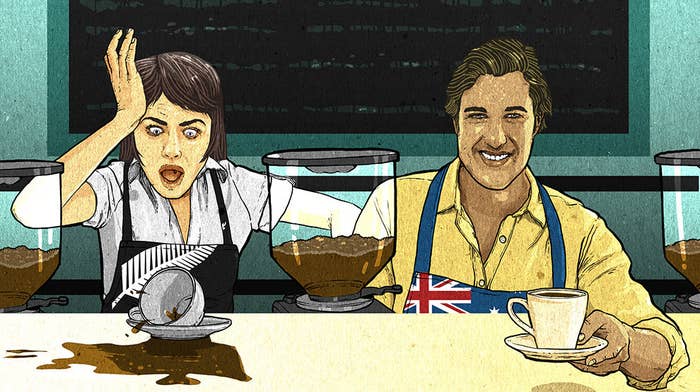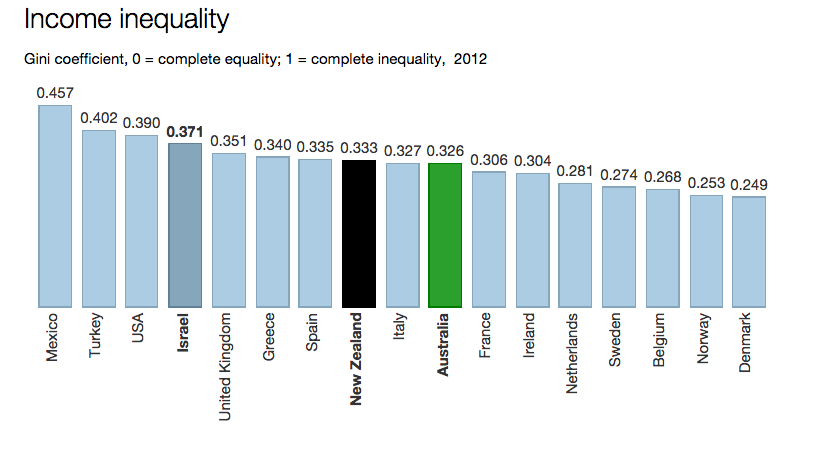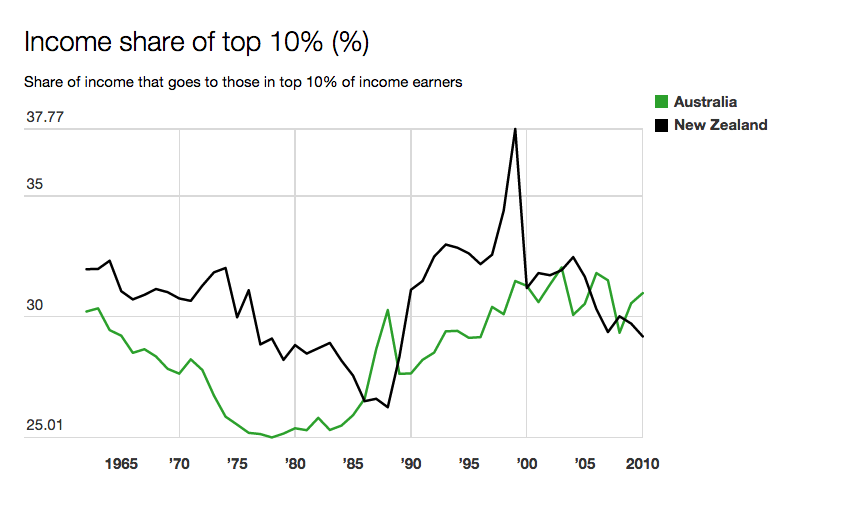There are some very clear signs the new Turnbull Government wants to do away with the mandated Sunday penalty rates for tens of thousands of cafe, bar and low-paid workers.

Aussie Sunday rates - usually at least 1.5x the regular hourly rate - could be replaced with lower Saturday rates.

So a BIG fight from unions and Labor is around the corner... but what will happen if Australia scraps Sunday rates?
New Zealand has a workplace relations system that is ~famously~ more flexible than Australia.
In Australia, much of the workplace is guided by mandated awards which tell employers how much they should pay employees in their sector. For instance, the Hair and Beauty Industry Award says that its casual workers must be paid 200% of their base rate on a Sunday. So a casual hairdresser might get $25/hour during the week and $50/hour on Sundays.
In New Zealand, these types of awards were scrapped in 1991, while the system gives no requirement for Sunday penalty rates.
Their lack of mandated Sunday penalty rates makes New Zealand what economists call a "natural experiment" for what might happen in Australia.
Of course, the overlapping effects of different laws, industries and culture mean what happens in New Zealand might not happen in Australia.
But, it could.
... and that's what makes it super interesting.
So, New Zealand has taught us three things about what might happen in Australia.
1. Hospitality workers would be WAY worse off.
Bar and cafe workers in New Zealand generally receive no extra pay for working on a Sunday. They are unable to negotiate a higher rate of pay even though workers, in general, prefer working regular hours during the week over working Sunday.

Talking about acting on penalty rates, Turnbull argued on 3AW radio recently, "if you want to get the support of workers and unions … then you inevitably would have to persuade them that in net terms they'd be better off".
Well in New Zealand, employers, in general, shifted pay to just the minimum required for hospitality workers. In a like-for-like comparison on hours worked, this would leave current Australian hospitality workers worse off.
If Australia was to scrap Sunday rates and workers can't be worse off, it would have to guarantee an overall increase in base pay across the week. Or there could be the introduction of compensation options such as tax credits (which would move the burden from employers to government/taxpayers).
Even then, we can expect months and months and months of articles on specific workers who no longer take home the same pay without their special penalty pay.
2. Cafes and restaurants would stay open longer.
Restaurants and cafes in New Zealand have more frequent Sunday trading and are open for more hours. And surprise surprise, this is likely due to the fact they have lower labour costs (pay their workers less).

This is why business groups such as Restaurant and Catering Australia have argued lower rates will create thousands more jobs. It argues new bars and cafes will open on Sundays and existing businesses will open longer.
Restaurant and Catering Australia CEO John Hart told the ABC, "it won't mean...[workers will]... take home less pay – they might just have to work an extra hour."
This means many of the new hours created by lowering penalty rates could be taken by current workers who now have to work longer to take home the same pay.
Still, New Zealand shows whilst pay may be lower on Sunday, more hours are available for existing and, perhaps, new workers.
3. Inequality, in general, will rise.
This is trickier. Pay gaps have increased in New Zealand since the introduction of their more flexible workplace system in 1991. According to their GINI coefficient, a very standard measure of income inequality, New Zealand in 2012 was marginally more unequal than Australia.

Income inequality skyrocketed in New Zealand from the early 1990s until the government introduced tax changes and reintroduced some workplace protections later in the decade.
A lot of things impact pay gaps and inequality including the general performance of the economy. Yet the Productivity Commission acknowledges low income groups have especially suffered in New Zealand. High-skilled workers continue to negotiate reasonable rates and conditions whilst the low-skilled get left behind.

Turnbull, Treasurer Scott Morrison and employment minister Michaelia Cash have spent a lot of time suggesting any changes to workplace laws need to be 'fair and reasonable'.
Pay gaps in New Zealand show it's difficult to make sure the most vulnerable are not made worse off when more ~flexibility~ is introduced into the labour market.
Are you confused at all?
Because it can get confusing... but we can learn from New Zealand.
If changes are made hospitality workers will get paid less on Sunday. They may get more hours and more people may get work. Not everyone will though, so some people will be worse off. The economy will be more "flexible" and we'll be able to buy more stuff, more of the time.
But, the most vulnerable are likely to feel the most pain from change.
